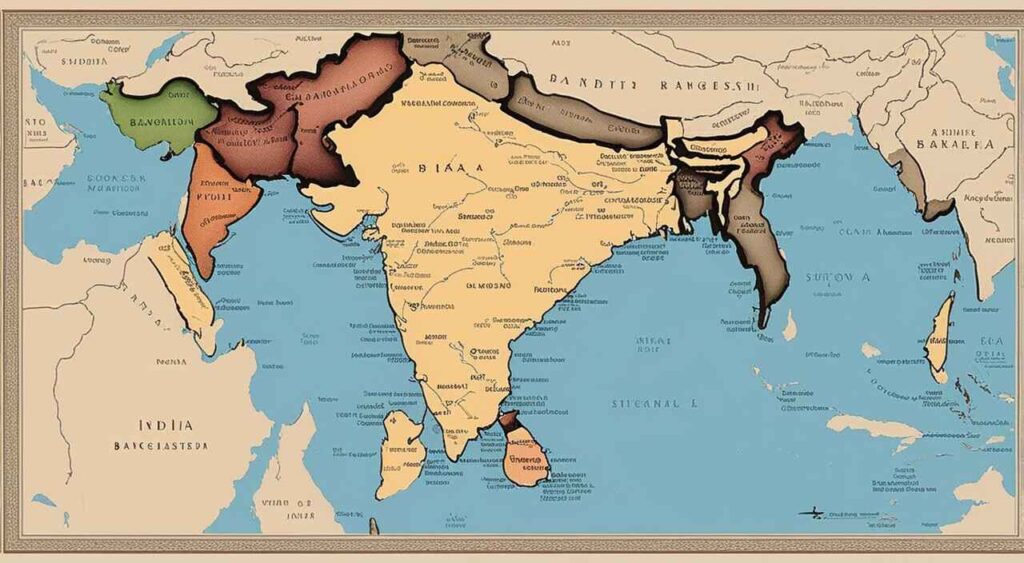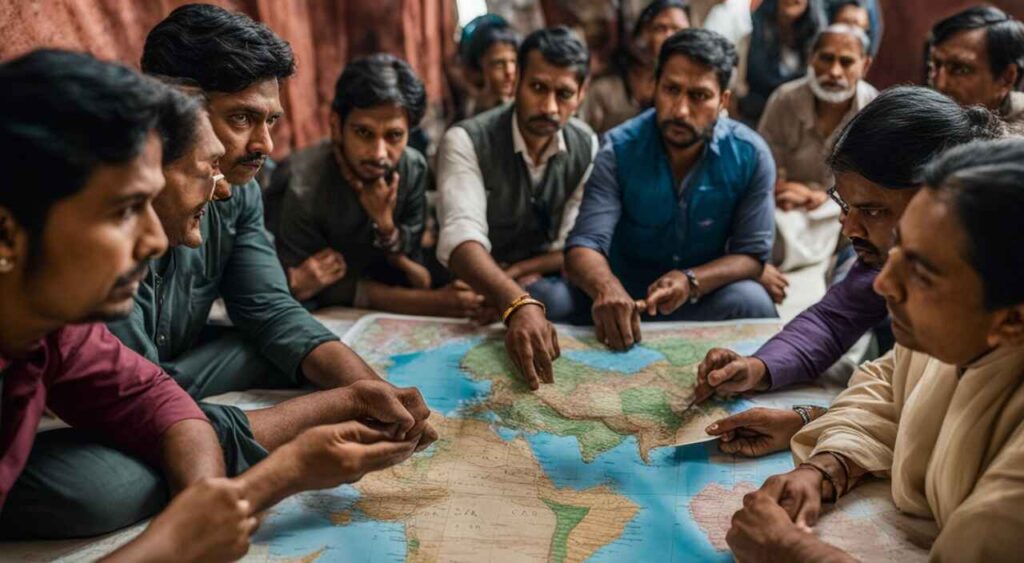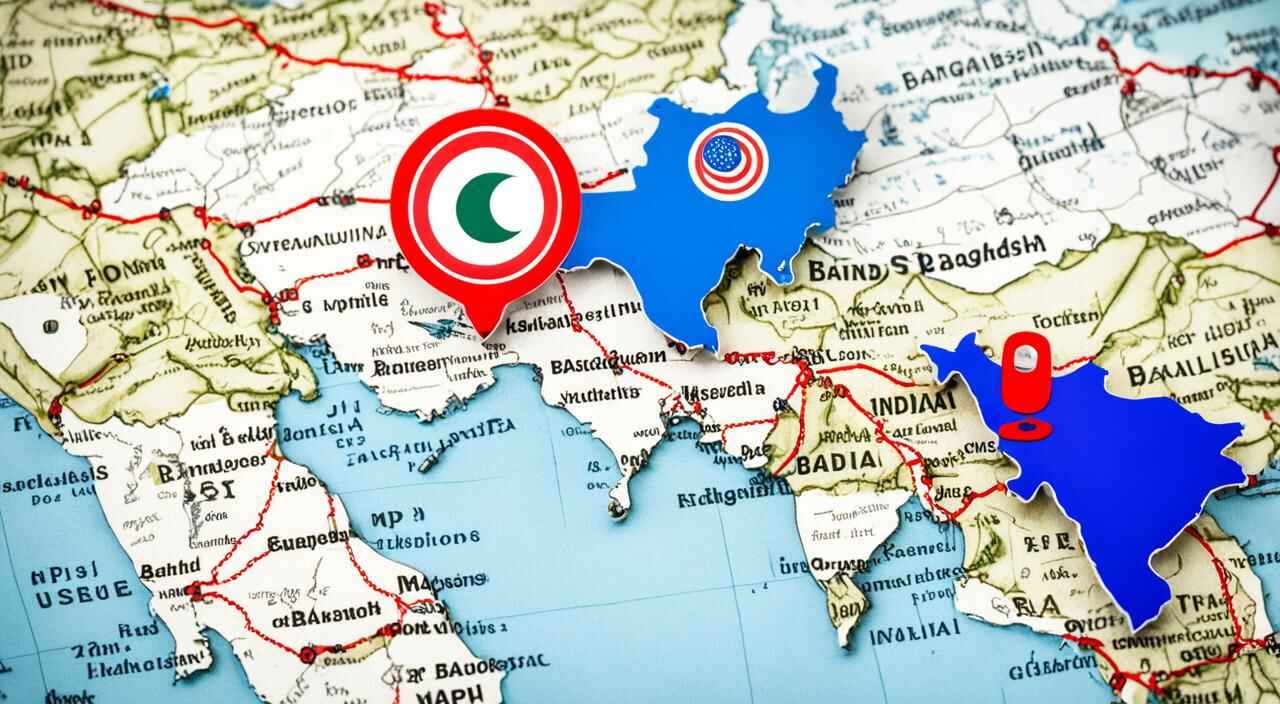The US is having important talks with India about what’s happening in Bangladesh. This comes as the region sees more civil unrest and big changes in politics. The US Consults India on Bangladesh Events, Superpower US Consults India on Bangladesh Events, and its friends are worried about the situation. They see these talks as key to keeping peace in a critical area.
Looking into the recent happenings in Bangladesh, it’s clear that the US and India’s talks are crucial. They aim to help Bangladesh by working together, Superpower US Consults India on Bangladesh Events. This way, they hope to create a stable place for democracy and peace to grow.
Introduction to Recent Events in Bangladesh
Bangladesh’s political scene has seen big changes lately. People are taking to the streets across the country. They’re upset about the government’s actions and policies under Prime Minister Sheikh Hasina. These events have caught the eye of both local and global observers, showing how shaky the government’s position is.
People are protesting because they’re unhappy with their economic situation and want more political freedom. They’re standing up for their rights and speaking out against the political climate. This could change how the country is run, making people wonder if the current leaders can keep their power.
It’s important to understand these events, especially with talks happening between the US and India. These talks show a wider worry about stability in the area. The situation in Bangladesh affects more than just its people; it has implications for the region.
Recent events have highlighted a society facing both dreams and frustrations. Experts are watching closely, seeing how these events could impact diplomatic ties and economic partnerships in the area.
The Role of the US in Regional Diplomacy
Looking at the US role in South Asia, we see a long history of American involvement. For years, the US has worked to create stable and democratic places in South Asia. Bangladesh is key to this effort because of its strategic location.
The US aims to build partnerships that fight security threats and support democracy. Working with regional allies helps tackle issues like terrorism and economic problems. A stable Bangladesh is good for the US and helps make South Asia safer and more prosperous.
The US uses diplomacy to push for democratic governments and human rights. This shows a deep commitment to working with South Asian countries as partners. It creates a space where everyone’s interests match up.
This way of doing regional diplomacy is key in dealing with the complex politics of the area. It shows how the US fits its foreign policy into South Asia’s specific situation. Working with countries like Bangladesh shows what the US sees as important in its diplomacy.
| Focus Areas | Description |
| Security Cooperation | Collaborating on counter-terrorism and military training initiatives. |
| Economic Engagement | Promoting trade agreements and investment opportunities to foster economic growth. |
| Human Rights Advocacy | Supporting programs aimed at enhancing democratic practices and protecting civil liberties. |
| Disaster Response | Providing humanitarian aid and disaster relief in crisis scenarios. |
US Talking to India and Neighboring Countries About Recent Events in Bangladesh
The situation in Bangladesh has led to important talks between the United States, India, and other nearby countries. These talks aim to understand the complex regional dynamics and tackle the political issues in Bangladesh. The US is working closely with India and other countries, showing the strength of the US-India partnership and the US’s strategy with neighboring countries.
Overview of the Consultation Process
High-level meetings and diplomatic talks are happening between the US, India, and Bangladesh’s neighbors. These talks aim to improve ties between India and Bangladesh and look for ways to work together. Officials from the US State Department are playing a big role, making sure the US responds well to the situation in Bangladesh.
Key Objectives of the US Engagement
The main goals of these talks are clear:
- Encouraging inclusive political dialogue within Bangladesh.
- Promoting regional stability through collaboration with neighboring countries.
- Fostering diplomatic engagement strategies that align with US foreign policy aims in South Asia.
These talks show a strong commitment to supporting democracy and cooperation. This helps both the US and its partners in the region.
| Objective | Description |
| Inclusive Dialogue | Encourage a broad-based political discussion to address national concerns in Bangladesh. |
| Regional Stability | Collaborate with neighboring countries to ensure a stable political environment. |
| Cooperation Enhancement | Strengthen partnerships with regional allies to address collective challenges. |
Implications for Bangladesh’s Political Climate
The recent events in Bangladesh, along with US-India talks, mark a key moment for its politics. The world is now watching how the country handles its governance and stability. Several factors could change its future path.
Talks between the US and India could boost trust in political leaders. If these big countries get involved, it might make leaders more accountable. But, if people see this as interference, it could make things harder for political stability in Bangladesh.
These discussions might also lead to reforms. If the US and India work together, they could help local governments. This could bring about changes that people want, like more openness and better governance.
But, there are worries about possible unrest. If political processes don’t meet people’s hopes, or if their needs aren’t met, things could get worse. The way these talks go will affect how stable or unstable Bangladesh becomes.
As Bangladesh deals with these issues, how it handles its relations with other countries will be crucial. The government’s actions will shape its political future.
Analysis of Bangladesh Prime Minister Sheikh Hasina’s Leadership
Bangladesh Prime Minister Sheikh Hasina is at a key point in her career. Her leadership has been under a lot of scrutiny lately. This is because of economic troubles, public unhappiness, and claims of authoritarian behavior.
Current Status and Challenges Faced
Prime Minister Sheikh Hasin’s government is facing many problems. Issues like high inflation and joblessness are making people unhappy. With elections coming up, her support might change.
She is trying to handle these problems with strategy and strong leadership. But, her methods are often criticized.
Public Opinion on Sheikh Hasina’s Government
People in Bangladesh have mixed feelings about Sheikh Hasina’s rule. Some still support her, but others worry about freedom and how the country is run. Surveys show more people are unhappy, especially young people and those in the opposition.
This growing criticism is making people talk about the need for better government. They want a government that listens to their concerns.
India’s Strategic Interests in Bangladesh
The story of India and Bangladesh is filled with deep cultural, economic, and political bonds. These India Bangladesh historical ties shape their relationship and the region’s dynamics. They give us a peek into India’s strong influence on Bangladesh.
Historical Ties Between India and Bangladesh
The split of India in 1947 helped create Bangladesh in 1971. India was key in the fight for Bangladesh’s freedom. This event started a strong bond based on shared history and culture.
Over time, this bond grew stronger through cultural exchanges, trade deals, and shared security worries. This strong relationship is the base of India’s strategic interests in Bangladesh.
India’s Influence on Bangladesh’s Policy Making
India has a big role in Bangladesh’s policy making in many areas. Economic partnerships, like trade and investment, have made their relationship stronger. They talk often to work together on things like sharing water, energy, and managing borders.
India’s foreign policy towards Bangladesh affects both their domestic and global views. Recent events show India’s wish to keep good relations for regional peace. This shows how connected the countries are in security and trade, shaping their future in a changing world.
| Area of Influence | Details |
| Cultural Exchange | People-to-people connections through cultural festivals and literary exchanges promote mutual understanding. |
| Economic Collaboration | Trade agreements encouraging bilateral trade and investment initiatives enhance economic ties. |
| Security Partnerships | Cooperation in counter-terrorism and regional security initiatives maintain stability. |
A map of India and Bangladesh from a historical perspective, showing the flow of people, goods, and ideas between the two countries. Highlight important landmarks, cultural sites, and trade routes that have shaped their relationship over time. Use warm colors to convey a sense of warmth and friendship, and depict the natural beauty of the land through lush vegetation and flowing rivers. Show how India’s strategic interests in Bangladesh have evolved over time, with an emphasis on economic cooperation and mutual benefit.

Bangladesh New Prime Minister 2024 – Predictions and Possibilities
The political scene in Bangladesh is changing fast as the 2024 elections draw near. People are talking a lot about who will be the Bangladesh new prime minister 2024. Many candidates are stepping forward, each with their own plans for the country.
These leaders will have different views on important issues that matter to the people. The way parties work together and what the public thinks will be key in making political predictions Bangladesh. How the current government has done and its solutions to economic and social problems will shape opinions.
Voter turnout and how engaged people are will also be crucial. It will show which candidates can really speak to the people.
Big countries like the US and India might also play a part in the election. They might back certain candidates who fit their goals in the region. So, the election campaigns will likely cover both local and global issues.
To sum up, the next prime minister of Bangladesh will be shaped by many things. From local activism to global politics, everything will play a role. Keeping an eye on these will help us understand what the future holds for the country.
Regional Reactions to US-India Consultations
The US-India talks about Bangladesh have sparked different reactions from nearby countries. It’s important to understand these reactions to see how South Asia is changing. These talks can greatly impact not just the relationship between countries but also the stability of the region.
Responses from Other Neighboring Countries
Pakistan, Myanmar, and Nepal have shared their thoughts on the US-India talks. Pakistan worries about the US having more influence in South Asia, seeing it as a threat to its own policies. Myanmar is watching carefully, focusing on its own interests. Nepal is cautious, concerned about how these talks might affect its foreign policy with India.
Impact on Regional Stability and Security
The situation in Bangladesh shows how US-India talks affect South Asia. Countries are looking at how these talks might change their security and how they interact with others. More talks could mean new alliances and how countries see security threats. This could make the region less stable, with each country deciding how to act based on these talks.

A group of people from different countries gathered around a table, some with serious expressions while others appear tense and uncertain. In the center of the table, there is a map of South Asia, with India and Bangladesh highlighted. On one side of the table, a person is pointing to the map while explaining something, while on the other side, another person looks worried and skeptical. The atmosphere is tense and charged with anticipation.
| Country | Response Type | Security Concerns |
| Pakistan | Opposition | Increased US influence seen as a threat |
| Myanmar | Cautious Observation | Maintaining national interest during evaluations |
| Nepal | Apprehension | Potential shifts in foreign policy |
Analysis of Bangladesh News Coverage on Recent Events
Looking into Bangladesh news coverage helps us see how the media shows recent political events. Many media outlets help shape what people think about Bangladesh, both at home and abroad. The stories told by journalists show the complex political situation today.
Mainstream Media Perspectives
Mainstream media is key in setting public opinion on politics. In Bangladesh, news outlets cover these topics in different ways:
- Critical Analysis: Some outlets focus on government actions and how people react, giving a critical view of politics.
- Supportive Coverage: Other media support government efforts, making their story positive.
- Diverse Opinions: Op-eds and columns offer different views, making public discussion richer.
This mix of coverage changes how people see their leaders and the country’s future. It also shapes the political scene.
The Role of Social Media in Shaping Public Discourse
Social media is now key in shaping talks on political events in Bangladesh. Sites like Facebook and Twitter let people:
- Share Information: News spreads fast, giving a people-first view of political changes.
- Mobilize Public Opinion: Hashtags and trending topics help people speak out, giving a voice to many groups.
- Engage in Dialogue: Online chats bring lively exchanges of ideas and opinions among Bangladeshi people.
Social media’s effect on public talk about Bangladesh events is huge. It connects people and groups, sparking important talks that go beyond usual media stories.
Conclusion
Looking back at recent events in Bangladesh, we see how vital international talks are. The talks between the US and India show a strong effort to help a region in trouble. These talks are very important for Bangladesh’s future.
The future of Bangladesh looks uncertain but hopeful. As things change, the US’s diplomatic efforts will likely affect Bangladesh’s decisions. Working together with neighbors like India is key to lasting peace and stability.
The ongoing talks between the US and India mark a key moment for regional cooperation. These talks aim to solve current problems and build a strong partnership. This partnership could make Bangladesh stronger against future challenges. The talks highlight how diplomacy helps us deal with complex issues and build a better future for Bangladesh and its people.
Who is the current Prime Minister of Bangladesh?
Prof Muhammad Yunus, chief adviser of the interim government in Bangladesh.
What are the implications of the US-India discussions for Bangladesh?
The talks aim to keep the region stable. They encourage political talks. They might also change how Bangladesh governs itself.
How is social media influencing public discourse in Bangladesh?
Social media, like Facebook and Twitter, is changing what people think and talk about. It’s helping to shape opinions on Bangladesh’s political situation.
How are neighboring countries reacting to the US-India consultations regarding Bangladesh?
Countries near Bangladesh are watching the US-India talks closely. They’re worried about how these talks might affect their security and diplomatic ties with Bangladesh.

